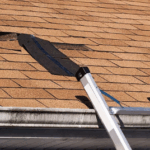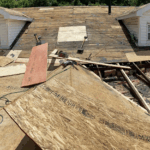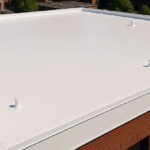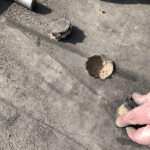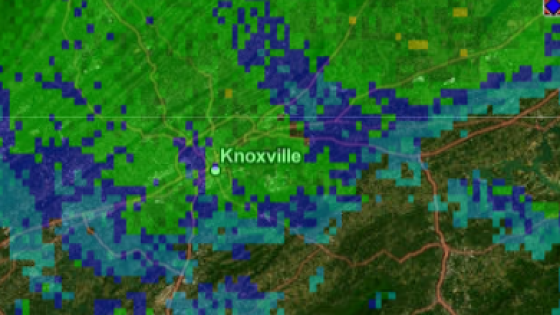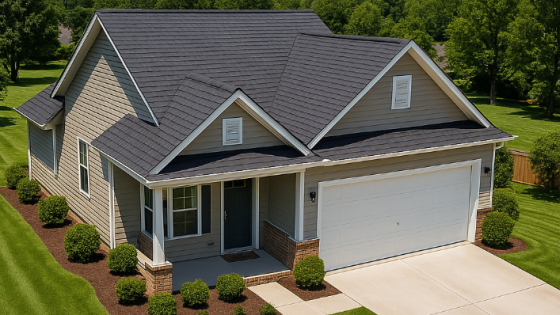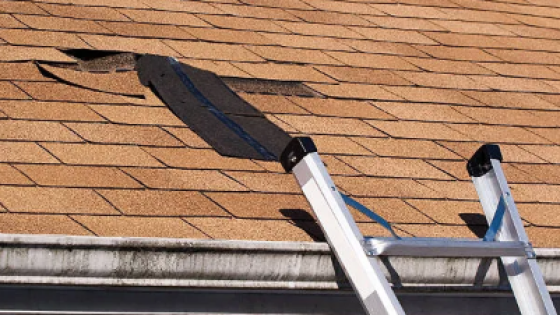Imagine this: a severe storm rolls through Knoxville, TN, leaving your roof in disrepair. You follow all the proper procedures, file a claim with your homeowners insurance, and then… it’s denied.
This can feel like a major setback, especially when you’re counting on your insurance to help cover costly roof repairs.
But don’t panic.
A claim denial isn’t the end of the road—it’s just the beginning of a process. Here’s what you need to know and do if your homeowners insurance claim is denied.
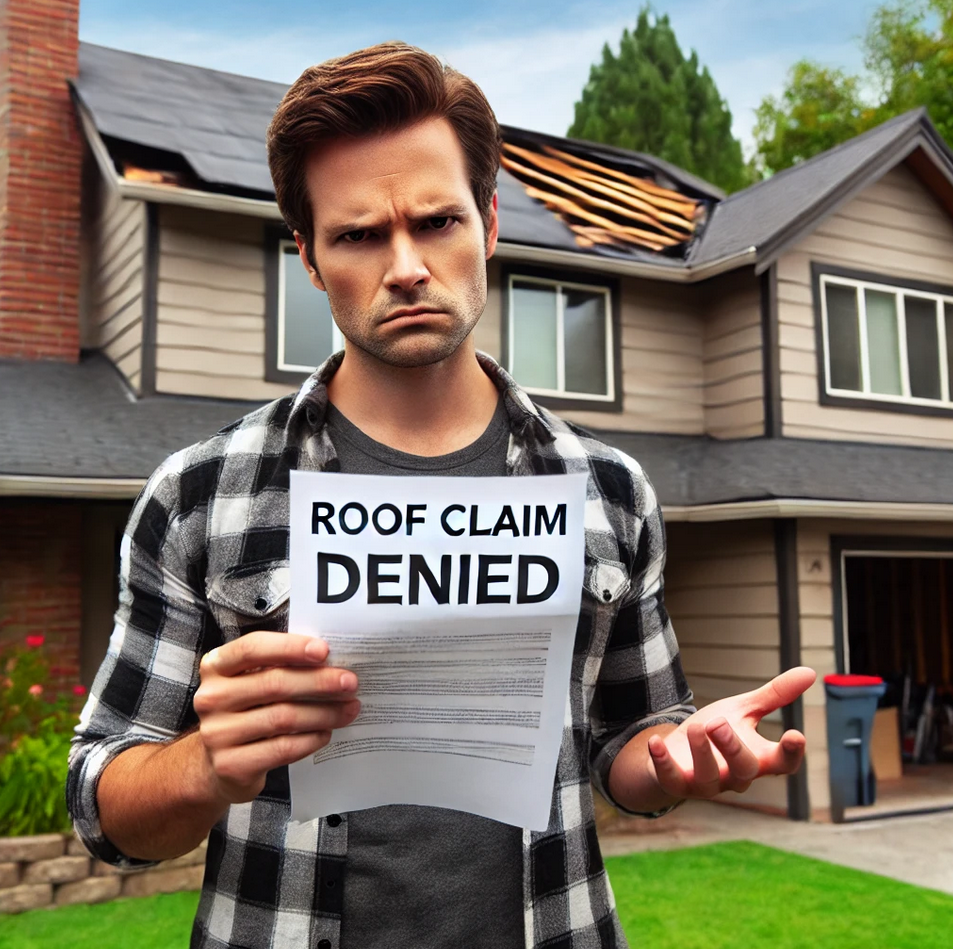
Understanding Why Insurance Claims Get Denied
Before diving into how to address a denied claim, it’s crucial to first understand the underlying reasons why homeowners insurance claims get rejected. Each insurance policy is unique, with specific coverage limits, exclusions, and terms. The reasons for a denial often stem from factors such as improper documentation, misunderstandings about the policy, or discrepancies in the claim itself. Let’s take a more detailed look at the common reasons claims get denied and what they mean for you.
1. Incomplete or Incorrect Documentation
One of the most frequent reasons for claim denials is improper or incomplete documentation. Insurance companies require thorough paperwork, and even the smallest of errors or missing information can lead to a claim being rejected. Whether it’s omitting important details, such as the date of the damage or failing to provide accurate contact information, these mistakes can trigger a denial.
2. Lack of Coverage
Another common reason for claim denial is that the damage simply isn’t covered under your policy. Homeowners’ insurance policies vary widely in what they cover, and some types of damage may be excluded. For example, standard homeowners insurance policies in Tennessee may not cover flood or earthquake damage, and may only provide partial coverage for damage caused by poor maintenance or aging.
3. Pre-existing Damage
Insurance policies are designed to cover sudden and accidental damage, not issues that existed before the event that triggered the claim. If your roof had pre-existing damage prior to the event in question, this could be a reason for a denial.
4. Missed Deadlines
Insurance companies operate on strict timelines. From the moment you notice damage to your roof or home, you must act quickly to report the issue to your insurer. Most policies require claims to be filed within a certain period, which could range from 30 to 90 days, depending on the insurer and the nature of the claim.
5. Disputes Over the Cause of Damage
The root cause of the damage is critical in determining whether your insurance claim will be approved or denied. If the insurance adjuster determines that the damage to your roof wasn’t caused by a covered peril (like a storm or fire), but rather by something like wear and tear or poor maintenance, your claim will be denied.
Now that you have an understanding of why claims may be denied, the next step is knowing what to do about it.
What to Do If Your Insurance Claim Is Denied
Having your homeowners insurance claim denied can feel like a huge setback, especially when you’re dealing with significant roof damage or costly repairs. However, a denial doesn’t mean you’re out of options. The key is to understand the reason behind the rejection and take the necessary steps to challenge it. Whether it’s a simple paperwork issue, a misunderstanding of your coverage, or a dispute over the cause of the damage, there are specific actions you can take to turn the situation around. Below is a step-by-step guide on what to do when your insurance claim is denied, so you can be better prepared to fight for the coverage you deserve.
1. Review the Denial Letter Thoroughly
After receiving a denial letter from your insurance company, your first step should be to read it carefully. The denial letter will usually outline the reasons why the claim was rejected. This is crucial information because it helps you determine your next steps, whether it’s gathering more evidence or submitting additional documentation.
2. Check Your Insurance Policy
Take a deep dive into your homeowners insurance policy to see if the denial was justified. Compare the denial reasons to the specific coverage outlined in your policy. For example, if your claim was denied because of “wear and tear” and your policy specifically excludes coverage for such issues, then the denial might be valid. However, if you believe the denial is based on incorrect interpretations or misunderstandings of your policy, you have a strong case to appeal.
3. Contact Your Insurance Company for Clarification
Sometimes, the denial can be the result of miscommunication or errors. Contact your insurance company directly to discuss the denial and ask for further clarification if needed. You may also want to ask for a second opinion from another adjuster.
4. Gather Additional Evidence
If your claim was denied because the insurance company disputes the cause or extent of the damage, it’s important to gather more evidence. This can include:
– Photos of the roof damage before and after the event.
– Documentation from contractors or roofing professionals, including quotes and assessments.
– Weather reports from the day of the damage, especially if the claim involves storm-related damage.
If you didn’t document the damage initially, consider hiring an independent inspector who can assess the situation.
5. Appeal the Decision
Most insurance companies have a formal appeals process. After gathering your documentation and evidence, you can submit an appeal. Be sure to meet all deadlines and requirements for submitting additional paperwork. Often, appealing a denied claim is successful, especially if you’ve gathered strong evidence and addressed any initial issues.
6. Seek Professional Help
If your appeal is unsuccessful, consider hiring a public insurance adjuster or attorney. A public adjuster works independently of the insurance company and can provide an objective evaluation of your claim. An attorney with experience in insurance disputes can also help you negotiate a settlement or take the issue to court, if necessary.
Common Reasons for Insurance Claim Denials & How to Address Them
| Reason for Denial | How to Address It |
|---|---|
| Incomplete or Incorrect Paperwork | Review and resubmit with accurate and complete information. |
| Lack of Coverage | Double-check your policy and assess if an appeal is feasible. |
| Pre-existing Damage | Provide evidence showing the damage was caused by a new event. |
| Missed Deadlines | Submit evidence showing the timeline or consult with an attorney. |
| Dispute Over Damage Cause | Gather more evidence, such as weather reports or contractor evaluations. |
FAQs about Homeowners Insurance Claims
Yes, but you’ll have to cover the costs out of pocket or find alternative financing options.
If you believe the denial was unjustified or a mistake, it’s often worth appealing.
Most insurance companies have deadlines for appeals, often 30-60 days. Check your policy.
In many cases, yes, as public adjusters can provide an unbiased assessment and negotiate on your behalf.
Yes, if you believe the denial was in bad faith, you can take legal action.
If roof damage isn't covered, you may need to explore other options like home improvement loans.
Not necessarily, but having a professional assessment can strengthen your claim.
Not directly, but frequent claims, whether approved or denied, could impact future rates.
You can negotiate or provide additional evidence to justify higher repair costs.
If you have new evidence, you may be able to reopen the case, but check with your insurance provider.




